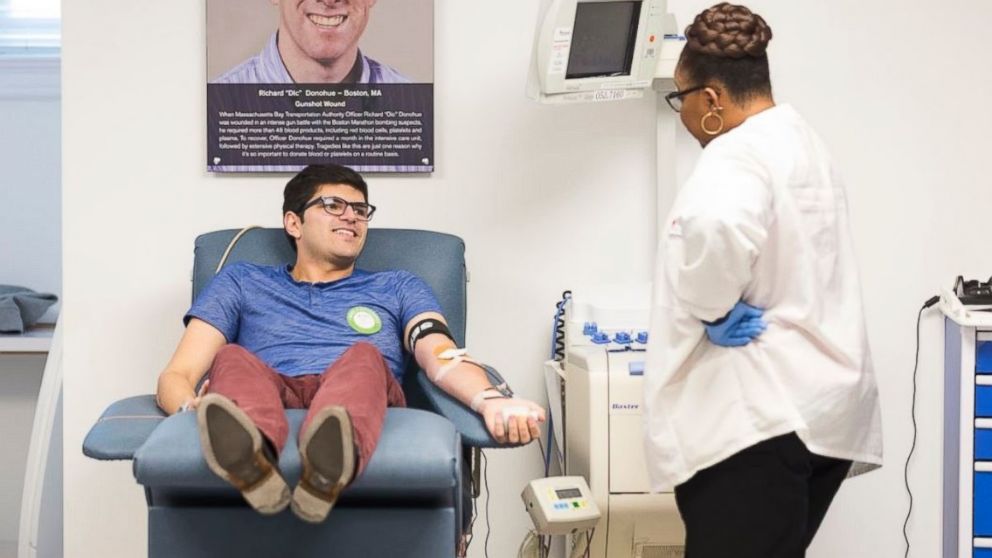Gay Man Documents Protest Over FDA Blood Donation Policy, Abstains From Sex for a Year
FDA requires male blood donors to abstain from sex with men for one year.

— -- After being turned away when he wanted to donate blood, an LGBT activist documented his efforts to meet the new requirements to give blood as a gay man, including abstaining from sexual relations for a year.
On Tuesday, Jay Franzone, 21, gave blood for the first time since he announced his protest against what he and other critics say are regulations that unfairly stigmatize and limit gay men. Franzone, a recent college graduate, has previously participated in protests against the U.S. Food and Drug Administration (FDA) policy as part of the National Gay Blood Drive. He has been widely interviewed during his year of protest.
"It's been a wild ride, I'm really grateful to have given blood," Franzone said, expressing gratitude for the encouragement he has received. "I was able to hear directly from so many different blood donors and their recipients."
Under FDA rules, men who have sex with men are banned from donating blood unless they abstain from sex for one year. The current policy was introduced in December 2015 as a change to policy set in 1983 during the AIDS crisis: a lifetime ban on blood donations for gay and bisexual men. For 30 years, the FDA disallowed their donations over concerns about infected blood from men who could have HIV, the virus that causes AIDS, which can be transmitted through transfusions.
The new guidelines are in line with the policies in other countries, including the United Kingdom, Brazil, Australia and Japan.
The American Medical Association had pushed for the lifetime ban to end and praised the FDA when the new policy was first introduced.
"The AMA has been a strong advocate for eliminating public policies that do not align with scientific evidence and best ethical practices in public policy," AMA officials said in a statement when the FDA policy was changed in 2015. "The FDA’s final guidance takes important steps to improve the balance ensuring health equity, engaging with high-risk populations, and protecting the safety of the national blood supply."
Franzone said he believes even though the lifetime ban was lifted, the current policy encourages "misconceptions and stigma." He believes the FDA policy should look at whether a potential donor's individual behavior is risky rather than restricting large groups of people. The FDA continues to ban sex workers, people who have been incarcerated for more than a year, intravenous drug users and people who have traveled to certain countries from donating blood.
"You can be a heterosexual person and have multiple high risk encounters," Franzone said, "and give blood the same day."
Franzone wrote an article about his experience, published in the New York Times today, as he ended his waiting time to donate blood.
He has received support from both people who have dealt with blood donation and community leaders, he said. One of them is Illinois Congressman Mike Quigley, who serves as Vice Chair of the Congressional LGBT Equality Caucus and has advocated for removing questions about sexual orientation on blood donation questionnaires.
"It has been a privilege to work with Jay on this critical issue, and I applaud him for his leadership and commitment," Quigley told ABC News. "Our nation's blood donation policy, which requires gay men to observe a 12-month celibacy period before donating, is both discriminatory and outdated. All healthy Americans who want to help save lives through blood donation should have the opportunity to do so."
Franzone said many families have also shared their experience with blood donations, encouraging his protest. One woman contacted him via Facebook he said, and thanked him after her cousin, a gay man, was unable to donate blood to help her son who had a cardiac condition.
"His partner and his friends kept [her son] company in a hospital," far from home, Franzone recounted. But they could not donate blood to help his medical condition.
The woman thanked Franzone over social media for both donating blood and drawing attention to the policy, he said, writing "thank you for giving him and kids like him the tools to fight."




